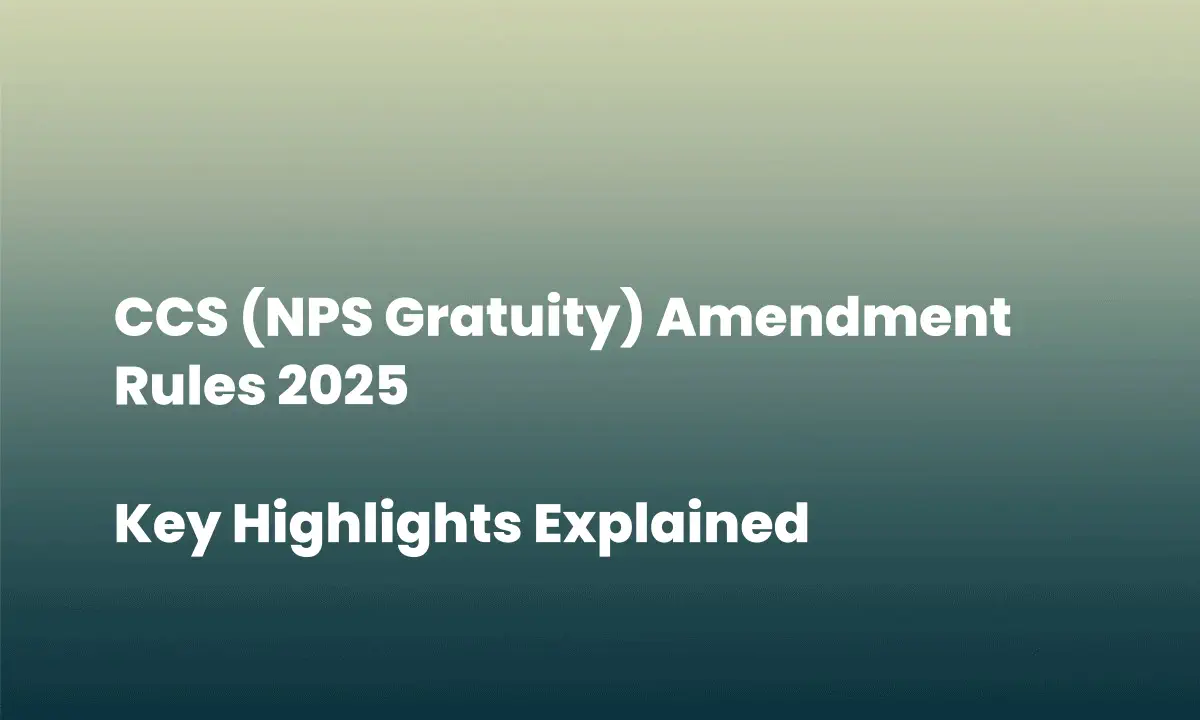Government Amends CCS (NPS Gratuity) Rules, 2025: Key Changes You Need to Know

Major Amendments Aimed at Enhancing Clarity, Ease, and Fairness for Central Government Employees
The Government of India has officially notified the Central Civil Services (Payment of Gratuity under National Pension System) Amendment Rules, 2025, introducing a series of significant changes to the existing gratuity framework under the National Pension System (NPS). These amendments, published in the Gazette of India, aim to streamline processes, expand definitions, provide clarity on service counts, and ensure fair treatment of government employees across various scenarios.
The amendments have come into effect from the date of their publication, i.e., April 24, 2025.
Key Highlights of the CCS Gratuity Amendment Rules, 2025
1. Expanded Definition of ‘Gratuity’
- The term “Gratuity” now includes Retirement Gratuity, Death Gratuity, and Residuary Gratuity under the rules.
- A new Rule 4A has been introduced to limit gratuity benefits for employees who are re-employed after retirement.
2. Service in Autonomous Bodies and State Governments
- Service rendered in State Governments and Autonomous Bodies will now qualify for gratuity under clear conditions:
- If the move was made with proper permission.
- If no separate gratuity was claimed from the previous employer.
- Importantly, in such cases, the liability for gratuity will be borne by the Central Government without recovering proportionate amounts from State Governments.
3. Gratuity for Missing Government Servants
- A comprehensive procedure has been laid down for granting gratuity to families of government servants who go missing.
- Death Gratuity will now be admissible after either:
- Seven years from the missing date, or
- Earlier if death is conclusively established.
- A claim must be filed with FIR and police confirmation.
4. Conditions for Withholding or Recovery from Gratuity
- The competent authority (President/Secretary/CAG) can withhold or recover gratuity if the retired employee is found guilty of:
- Corruption,
- Misconduct,
- Negligence causing pecuniary loss to the Government.
- UPSC consultation is mandatory before final orders by the President.
5. Introduction of Notional Pay Adjustments
- Notional pay increases, resulting from retrospective promotions or revised pay scales after retirement, will now be included for calculating gratuity and emoluments.
6. Interest on Delayed Gratuity Payments
- Strict norms have been laid down for paying interest if gratuity is delayed due to administrative reasons.
- Accountability for delay must be fixed on responsible officers.
7. Treatment of Extraordinary Leave
- Extraordinary leave taken on a medical certificate will now be counted as qualifying service for gratuity.
- Clear instructions have been laid down regarding when non-medical extraordinary leave should or should not count.
8. Cases of Death During Penalty Periods
- If a penalty affecting pay was active during death, the original emoluments (ignoring penalty) will be considered for gratuity calculations.
Other Important Amendments at a Glance
- Superannuation replaces the term compulsory retirement at multiple places for more appropriate usage.
- Simplified rules for death gratuity payments to eligible family members.
- Condonation of service interruption is allowed only in exceptional circumstances after giving the employee a chance for representation.
- Revised processes for issuing No Demand Certificates related to government accommodation.
- Faster timelines: Many procedural steps now have tighter deadlines — for example, sanction of gratuity is to be completed much faster.
- Clear provisions for employees absorbed into State Governments or Public Sector Undertakings after Central Government service.
Why These Changes Matter
The 2025 amendments bring much-needed transparency and procedural efficiency, addressing several practical difficulties faced by retiring or deceased employees’ families. The rules now clearly cover modern employment scenarios like re-employment, autonomous body transfers, missing persons, and disciplinary proceedings pending at the time of retirement.
By aligning gratuity payment conditions closely with service realities, the government aims to deliver a more employee-centric and accountable framework.
Conclusion
The Central Civil Services (Payment of Gratuity under National Pension System) Amendment Rules, 2025 mark an important shift in the gratuity regime for NPS subscribers in Central Government services. These reforms not only simplify and modernize procedures but also strengthen safeguards for employees and their families.
Employees and pensioners are encouraged to familiarize themselves with the changes to understand how their gratuity rights might be affected or enhanced.
Quick Summary Table
| Aspect | Key Change |
|---|---|
| Definition of Gratuity | Expanded to include death, retirement, and residuary gratuity |
| Missing Government Servant | Death gratuity after 7 years or confirmed death |
| Re-employment | No separate gratuity unless conditions met |
| Autonomous Bodies/State Govt Service | Detailed rules for service count and gratuity eligibility |
| Delay in Gratuity Payment | Interest payable; responsibility to be fixed |
| Notional Pay Increases | Included in emoluments for gratuity calculation |
| Death During Penalty | Ignore penalty for gratuity calculation |
View Gazette Notification:
 Loading…
Loading…




